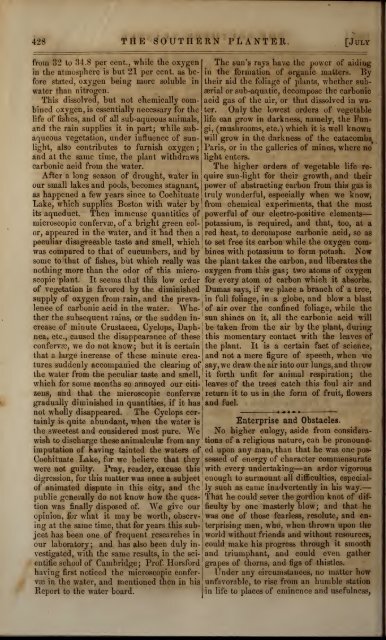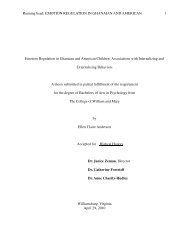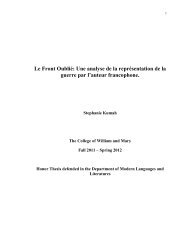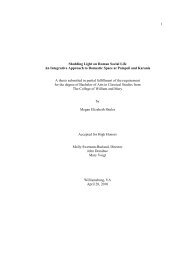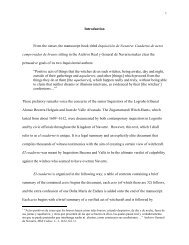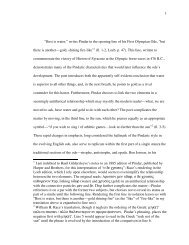Southern planter - The W&M Digital Archive
Southern planter - The W&M Digital Archive
Southern planter - The W&M Digital Archive
You also want an ePaper? Increase the reach of your titles
YUMPU automatically turns print PDFs into web optimized ePapers that Google loves.
428 THE SOUTHERN PLANTER. [July<br />
from 32 to 34.8 per cent., while the oxygen<br />
in the atmosphere is but 21 per cent, as be-<br />
fore stated, oxygen being more soluble in<br />
water than nitrogen.<br />
This dissolved, but not chemically combined<br />
oxygen, is essentially necessary for the<br />
life of fishes, and of all sub-aqueous animals,<br />
and the rain supplies it in part; while subaqueous<br />
vegetation, under influence of sunlight,<br />
also contributes to furnish oxygen<br />
and at the same time, the plant withdraws<br />
carbonic acid from the water.<br />
After a long season of drought, water in<br />
our small lakes and pools, becomes stagnant,<br />
as happened a few years since to Cochituate<br />
Lake, which supplies Boston with water by<br />
the water from the peculiar taste and smell, |<br />
which for some months so annoyed our citi-<br />
zens, and that the microscopic confervae i<br />
gradually diminished in quantities, if it has,<br />
not wholly disappeared. <strong>The</strong> Cyclops cer-<br />
tainly is quite abundant, when the water is<br />
the sweetest and considered most pure. We<br />
wish to discharge these animalculae from any<br />
imputation of having tainted the waters of,<br />
Cochituate Lake, for we believe that they<br />
were not guilty. Pray, reader, excuse this<br />
j<br />
digression, for this matter was once a subject<br />
of animated dispute in this city, and the<br />
public generally do not know how the question<br />
was finally disposed of. We give our<br />
opinion, for what it may be worth, observing<br />
at the same time, that for years this sub-<br />
ject has been one of frequent researches in<br />
j<br />
our laboratory; and has also been duly in-<br />
vestigated, with the same results, in the sci-<br />
j<br />
entific school of Cambridge; Prof. Horsford<br />
having first noticed the microscopic confer-<br />
vae in the water, and mentioned then in his<br />
Report to the water board.<br />
<strong>The</strong> sun's rays have the power of aiding<br />
in the formation of organic matters. By<br />
their aid the foliage of plants, whether subaerial<br />
or sub-aquatic, decompose the carbonic<br />
acid gas of the air, or that dissolved in water.<br />
Only the lowest orders of vegetable<br />
life can grow in darkness, namely, the Fungi,<br />
(mushrooms, etc.) which it is well known<br />
will grow in the darkness of the catacombs 4<br />
Paris, or in the galleries of mines, where no<br />
j<br />
I<br />
j<br />
light enters.<br />
<strong>The</strong> higher orders of vegetable life require<br />
sun-light for their growth, and their<br />
power of abstracting carbon from this gas is<br />
truly wonderful, especially when we know,<br />
from chemical experiments, that the most<br />
its aqueduct. <strong>The</strong>n immense quantities of powerful of our electro-positive elements<br />
microscopic confervas, of a bright green col- potassium, is required, and that, too, at a<br />
or, appeared in the water, and it had then a red heat, to decompose carbonic acid, so as<br />
peculiar disagreeable taste and smell, which to set free its carbon while the oxygen com-<br />
was compared to that of cucumbers, and by bines with potassium to form potash. Now<br />
some to that of fishes, but which really was the plant takes the carbon, and liberates the<br />
nothing more than the odor of this micro- oxygen from this gas; two atoms of oxygen<br />
scopic plant. It seems that this low order for every atom of carbon which it absorbs.<br />
of vegetation is favored by the diminished Dumas says, if we place a branch of a tree,<br />
supply of oxygen from rain, and the preva- in full foliage, in a globe, and blow a blast<br />
lence of* carbonic acid in the water. Whe- of air over the confined foliage, while the<br />
ther the subsequent rains, or the sudden in- sun shines on it, all the carbonic acid will<br />
crease of minute Crustacea, Cyclops, Daph-j be taken from the air by the plant, during<br />
nea, etc., caused the disappearance of these this momentary contact with the leaves of<br />
confervas, we do not know; but it is certain the plant. It is a certain fact of science,<br />
that a large increase of these minute crea- and not a mere figure of speech, when we<br />
tures suddenly accompanied the clearing of; say, we draw the air into our lungs, and throw<br />
it forth unfit for animal respiration; the<br />
leaves of the trees catch this foul air and<br />
return it to us in<br />
and fuel.<br />
the form of fruit, flowers<br />
Enterprise and Obstacles.<br />
No higher eulogy, aside from considerations<br />
of a religious nature, can be pronounced<br />
upon any man, than that he was one possessed<br />
of energy of character commensurate<br />
with every undertaking—an ardor vigorous<br />
enough to surmount all difficulties, especially<br />
such as came inadvertently in his way.<br />
That he could sever the gordion knot of difficulty<br />
by one masterly blow; and that he<br />
was one of those fearless, resolute, and enterprising<br />
men, who, when thrown upon the<br />
world without friends and without resources,<br />
could make his progress through it smooth<br />
and triumphant, and could even gather<br />
grapes of thorns, and figs of thistles.<br />
Under any circumstances, no matter how<br />
unfavorable, to rise from an humble station<br />
in life to places of eminence and usefulness,


